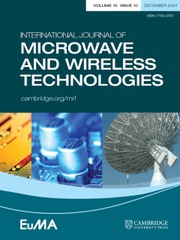An explicit single-layer frequency selective surface design with wide stop band frequency response
Published online by Cambridge University Press: 22 March 2018
Abstract
This manuscript deals with the development of a novel configuration of a wide-band single-layer frequency selective surface (FSS) for wide-band rejection applications. The established unit cell is composed of a simple circular ring on the top side of the substrate and a combined conductive element on the backside. Such an inclusion of conductive elements and accurate tuning of their dimensions ends in the rejection of a wide frequency band extended from 6.3 to 16.3 GHz. Moreover, the proposed structure exhibits a stable response against different angles of incidence for both TE and TM polarizations. Detailed simulation and measurement studies are carried out to investigate the performance of the proposed FSS. The obtained results are discussed in depth.
Information
- Type
- Research Papers
- Information
- International Journal of Microwave and Wireless Technologies , Volume 10 , Special Issue 7: Electronic Warfare , September 2018 , pp. 819 - 825
- Copyright
- Copyright © Cambridge University Press and the European Microwave Association 2018
References
- 6
- Cited by

